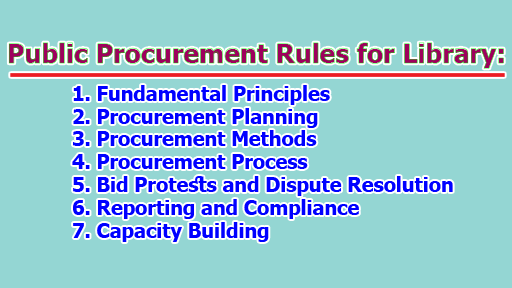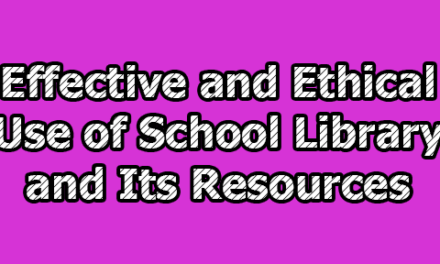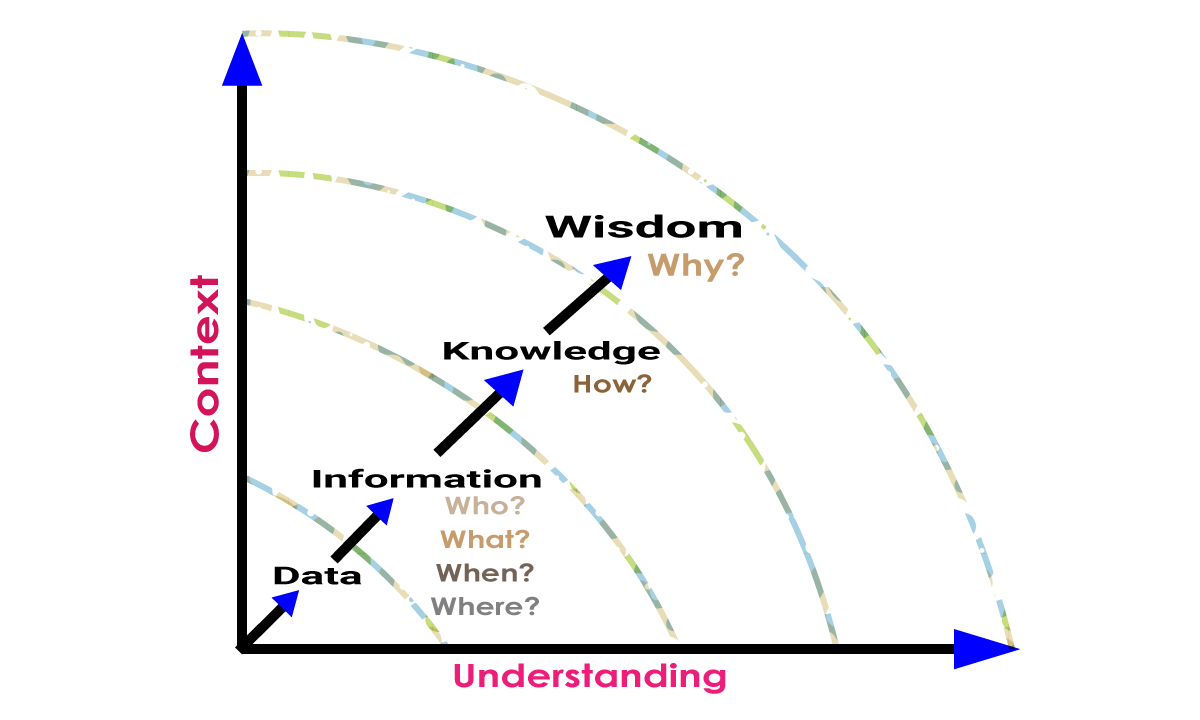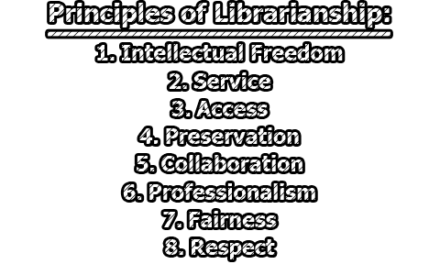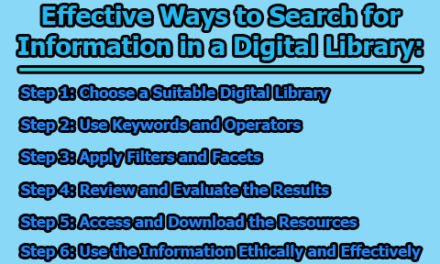Public Procurement Rules for Library:
Public libraries stand as pillars of knowledge and learning within our communities, enriching lives by providing access to information, resources, and cultural enrichment. To fulfill their essential role, libraries must ensure prudent and responsible utilization of public funds while procuring goods, services, and works that meet the diverse needs of their users. The establishment of comprehensive and well-defined public procurement rules for libraries is paramount to promoting transparency, fairness, and efficiency throughout the procurement process. These rules guide library administrators, procurement officers, and stakeholders in conducting procurement activities that not only uphold the principles of accountability and ethical conduct but also foster innovation, sustainability, and value for money. Emphasizing the importance of adherence to legal and ethical standards, this document serves as a detailed guide to public procurement for libraries, ultimately enhancing their capacity to serve and empower their communities effectively. In the rest of this article, we are going to learn about public procurement rules for library.
1. Fundamental Principles:
a) Transparency: Transparency is the cornerstone of public procurement in libraries. All procurement activities should be conducted in a manner that allows stakeholders and the public to observe the process and understand how decisions are made. To achieve transparency:
- Libraries must publish procurement opportunities, including tender notices and bid invitations, on their official website and other relevant public platforms.
- The procurement process, including evaluation criteria and award decisions, should be clearly documented and made available to interested parties upon request.
- Libraries should maintain a public procurement register, which provides comprehensive information about past procurement activities, including contract details and awarded suppliers.
b) Fairness and Non-Discrimination: Libraries must ensure that all potential suppliers and contractors are treated fairly and without discrimination during the procurement process. To promote fairness:
- Procurement officers and evaluation committees must be impartial and free from any conflicts of interest that could compromise the integrity of the process.
- Evaluation criteria should be objective, quantifiable, and relevant to the project’s requirements, and all bidders should be assessed based on the same criteria.
- Libraries should provide clear feedback to unsuccessful bidders, explaining the reasons for their non-selection.
c) Value for Money: Obtaining the best value for money is crucial in public procurement. Libraries should seek to optimize the balance between cost, quality, and performance to deliver the most efficient and effective services to the public. To ensure value for money:
- Libraries should conduct a comprehensive cost-benefit analysis before making procurement decisions, considering both short-term and long-term impacts.
- Cost-effectiveness should not compromise quality or adherence to ethical and environmental standards.
- Libraries should encourage innovation and creative solutions from bidders to achieve value for money while meeting project objectives.
d) Ethical Conduct: Ethical conduct is paramount in public procurement. Libraries and all individuals involved in the process must adhere to strict ethical standards to avoid conflicts of interest and corruption. To maintain ethical conduct:
- Libraries should establish a code of conduct for procurement staff, suppliers, and contractors, outlining the expected behaviors and penalties for violations.
- Gifts, favors, or any form of inducements should not be accepted by library staff or evaluation committees from suppliers or contractors.
- Libraries should require suppliers to declare any potential conflicts of interest in their bid submissions.
e) Sustainability: Libraries have a responsibility to consider sustainability factors in their procurement activities. Environmental and social impacts should be taken into account to promote sustainable practices. To incorporate sustainability:
- Libraries should include sustainability criteria in their bid evaluation process, giving preference to environmentally friendly and socially responsible solutions.
- Collaboration with suppliers and contractors to implement sustainable practices should be encouraged.
2. Procurement Planning:
a) Needs Assessment: Libraries should undertake a thorough needs assessment, involving relevant stakeholders, to identify and define the required goods, services, or works accurately. The assessment should consider factors such as anticipated demand, technological advancements, and changing user needs.
b) Budget Allocation: A clear and realistic budget must be allocated for each procurement activity. The budget should account for all costs, including acquisition, installation, maintenance, and training expenses.
c) Market Research: Before initiating any procurement process, libraries should conduct market research to gain insights into the availability of suppliers, current market conditions, and prevailing prices for the required goods and services. This research helps libraries make informed decisions and negotiate competitive prices.
3. Procurement Methods:
a) Open Competitive Bidding: Open competitive bidding is the primary method for most procurements. Libraries publicly invite all interested and qualified bidders to submit their bids in response to a detailed procurement notice. The bidding process must be accessible, transparent, and open to all eligible suppliers.
b) Limited Competitive Bidding: Limited competitive bidding is suitable when specific circumstances justify limiting the number of bidders. This method is commonly used for specialized goods or services with few qualified suppliers.
c) Request for Quotations: Libraries may use the request for quotations (RFQ) method for smaller procurement activities, where they invite a select group of suppliers to provide quotes for the required goods or services.
d) Direct Contracting: Direct contracting, also known as single-source procurement, is only permissible under exceptional circumstances. It applies when there is only one qualified supplier capable of providing the required goods or services, or in emergency situations.
e) Framework Agreements: Libraries may establish framework agreements with multiple suppliers for a specific category of goods or services. This streamlines the procurement process for future needs, ensuring efficiency and competitive pricing.
4. Procurement Process:
a) Advertising and Notification: Libraries must widely advertise procurement opportunities to attract a diverse pool of qualified bidders. The procurement notice should contain essential information such as the description of the procurement, eligibility criteria, submission deadline, and contact details.
b) Bid Evaluation: The bid evaluation process should be conducted in a fair, transparent, and systematic manner. Evaluation committees should be formed with expertise in the relevant fields to ensure comprehensive assessments.
c) Awarding the Contract: The contract should be awarded to the bidder who meets all the evaluation criteria and provides the best value for money. Libraries must communicate the award decision to all participating bidders promptly.
d) Contract Management: Proper contract management is essential to ensure that suppliers fulfill their obligations as per the agreed terms and conditions. Libraries should monitor performance, deliverables, and compliance throughout the contract period.
5. Bid Protests and Dispute Resolution:
a) Bid Protests: Libraries should establish a transparent and accessible procedure for handling bid protests from aggrieved bidders. A bid protest may arise if a bidder believes that the evaluation process was unfair or if there is evidence of misconduct.
b) Dispute Resolution: Libraries should have a mechanism for resolving disputes that may arise during the contract period. Mediation, arbitration, or legal proceedings can be employed to resolve conflicts between libraries and suppliers or contractors.
6. Reporting and Compliance:
a) Annual Procurement Report: Libraries should prepare and publish an annual procurement report summarizing all procurement activities conducted during the year. This report should include details about contracts awarded, their values, suppliers’ names, and any significant issues encountered.
b) Compliance Monitoring: Regular audits should be conducted to assess the library’s adherence to procurement rules and identify areas for improvement. The audit process should be independent and impartial.
7. Capacity Building:
a) Training: Libraries should invest in training procurement officers and staff involved in the procurement process. Training should cover relevant laws, regulations, best practices, ethical conduct, and sustainable procurement principles.
b) Collaboration: Libraries can collaborate with other public institutions, procurement experts, and relevant stakeholders to share experiences, best practices, and knowledge related to public procurement.
In conclusion, robust and transparent public procurement rules form the backbone of a well-functioning library system that efficiently caters to the needs of its diverse user base. By adhering to these principles of transparency, fairness, and efficiency, libraries can instill public confidence in the integrity of their operations while ensuring responsible stewardship of taxpayer funds. The comprehensive procurement guidelines outlined herein offer a roadmap for libraries to navigate the complexities of procurement, emphasizing ethical conduct, sustainability, and value for money. As libraries adapt to the evolving landscape of information and technology, the implementation of these rules will enable them to remain dynamic and responsive to the changing needs of their communities. By continuously evaluating and improving their procurement practices, libraries can build on the foundation of accountability and integrity, further enhancing their capacity to serve as beacons of knowledge, enlightenment, and cultural enrichment for generations to come. Through a collective commitment to these principles, libraries can continue to inspire, educate, and empower individuals, fostering a society enriched by the wealth of accessible information and ideas that libraries so diligently safeguard and disseminate.
FAQs:
What is public procurement in libraries?
Public procurement in libraries refers to the process of acquiring goods, services, and works needed to support the library’s mission of providing access to knowledge and information to the public. It involves soliciting bids from suppliers or contractors, evaluating those bids, and awarding contracts to the most suitable providers while adhering to principles of transparency, fairness, and efficiency.
Why are public procurement rules essential for libraries?
Public procurement rules are crucial for libraries to ensure accountability, prevent corruption, and promote fair competition among suppliers. These rules provide a framework for transparent and ethical procurement practices, allowing libraries to obtain the best value for money while fulfilling their mandate to serve the public.
What are the fundamental principles of public procurement in libraries?
The fundamental principles of public procurement in libraries include transparency, fairness, value for money, ethical conduct, and sustainability. These principles guide the procurement process and decision-making, ensuring that libraries operate with integrity and responsibility.
What are the common methods of procurement used in libraries?
Common methods of procurement in libraries include open competitive bidding, limited competitive bidding, request for quotations (RFQ), direct contracting, and framework agreements. The appropriate method depends on factors such as the complexity of the procurement and the number of qualified suppliers available.
How can libraries ensure transparency during the procurement process?
Libraries can ensure transparency during the procurement process by publishing procurement opportunities on their official website and other public platforms, disclosing evaluation criteria, maintaining a procurement register, and providing access to bid evaluation results upon request.
What role does sustainability play in public procurement for libraries?
Sustainability plays a significant role in public procurement for libraries by encouraging the consideration of environmental and social factors in procurement decisions. Libraries are encouraged to choose suppliers and practices that are environmentally friendly and socially responsible.
What steps should libraries take in the procurement planning phase?
During the procurement planning phase, libraries should conduct a thorough needs assessment, allocate a realistic budget, and conduct market research to understand supplier availability and market conditions. Proper planning ensures that the procurement process is well-informed and targeted.
How can libraries handle bid protests and disputes arising from the procurement process?
Libraries should establish a transparent and accessible process for handling bid protests from aggrieved bidders. Additionally, they should have a mechanism for resolving disputes that may arise during the contract period, such as through mediation, arbitration, or legal proceedings.
What is the importance of compliance monitoring in public procurement for libraries?
Compliance monitoring is essential to ensure that libraries adhere to procurement rules and regulations, promoting accountability and preventing malpractice. Regular audits help identify areas for improvement and ensure that procurement practices align with legal and ethical standards.
How can libraries enhance their procurement practices through capacity building?
Libraries can enhance their procurement practices through capacity building by investing in training for procurement officers and staff involved in the procurement process. Collaboration with other institutions and experts also allows for the exchange of best practices and knowledge.
How will adherence to public procurement rules benefit libraries and their communities?
Adherence to public procurement rules benefits libraries and their communities by promoting transparent and accountable use of public funds, ensuring fair competition among suppliers, and delivering value for money. These practices help libraries fulfill their mission of providing accessible and high-quality resources to the public while maintaining public trust and confidence.
Where can libraries find more information about specific procurement rules and regulations in their region?
Libraries can find more information about specific procurement rules and regulations in their region through government procurement websites, legal databases, and official publications of relevant authorities responsible for public procurement oversight. Seeking advice from legal experts or professional procurement organizations can also provide valuable insights.

Library Lecturer at Nurul Amin Degree College

